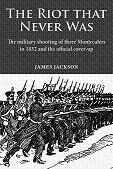
The Riot That Never Was: The Military Shooting Of Three Montrealers In 1832 And The Official Cover-up
James Jackson
Baraka Books
$29.95
paper
360pp
978-0-981240558
Such was the accusation levelled by one newspaper editor at the Patriotes, a political party in Lower Canada (present-day Quebec), and one of its prominent members, Irish-born journalist Daniel Tracey. Tracey won a by-election with a slim margin in May 1832. When the polls closed on May 21, Patriote supporters started a riot in the Place d’Armes, and British troops opened fire on the crowd, killing three people. The author of the above passage had no doubt that the Patriotes, as the instigators of the riot, were to blame for the deaths.
In The Riot that Never Was, James Jackson disputes this interpretation, arguing that the skirmishes and celebratory outbursts in the square that day simply did not add up to a riot. He makes the case that the magistrates who ordered troops to fire were hoping to control the outcome of the election with their show of force. Relying primarily on government journals and newspaper editorials, Jackson describes the final day of voting in exhaustive detail and scrutinizes the testimony of dozens of witnesses in the subsequent 14-month inquiry.
His argument is persuasive: it seems likely that the authorities’ reaction to post-electoral excitement was out of proportion to the danger posed, and that they were eager to put Patriote supporters in their place. On the other hand, it does not seem implausible that the magistrates, already predisposed to view Tracey’s supporters as unruly members of the lower classes, genuinely saw the situation as explosive. The Patriotes had been pushing for democratic reforms for some time, and the ruling class may well have felt threatened by the groundswell of support for Tracey. Indeed, five years later tensions erupted in a rebellion led by the Patriotes. Whatever the magistrates’ motivations, their actions had an unintended polarizing effect.
Unfortunately, Jackson shows little inclination to situate this incident in a historical context. In a provocative introduction, he notes that he “avoided wider historiographical issues surrounding the events of May 21 such as the nature of civil-military relations at the time, their impact on society and political life, the role of ethnicity in what happened and the use made of public space. Instead, I have concentrated on events rather than on theory.”
He is true to his word, rarely stepping back from the day in question to look at the bigger picture. For anyone not well-versed in Quebec history, this is likely to cause some frustration. Even a brief discussion of attitudes to colonial power, the emergence of the Patriote movement, or the ethnic divisions that marked Montreal society would help to orient the reader. Instead, Jackson dives into a sea of names and details, leaving the unsuspecting reader to breathlessly sort out which ones are important to retain.
He spends even less time analyzing the repercussions of the event. In the final paragraph of the book, he notes that the shootings and their aftermath radicalized some Patriotes, paving the way for “the events of 1837 and 1838.” This confusingly vague reference to the Patriotes’ rebellion deserves to be developed and explored, but instead it serves as a closing statement. Jackson is engaging as a sleuth, but he focuses his investigative lens so narrowly that he may fail to convince readers of the broader significance of a seemingly minor historical episode. mRb






0 Comments